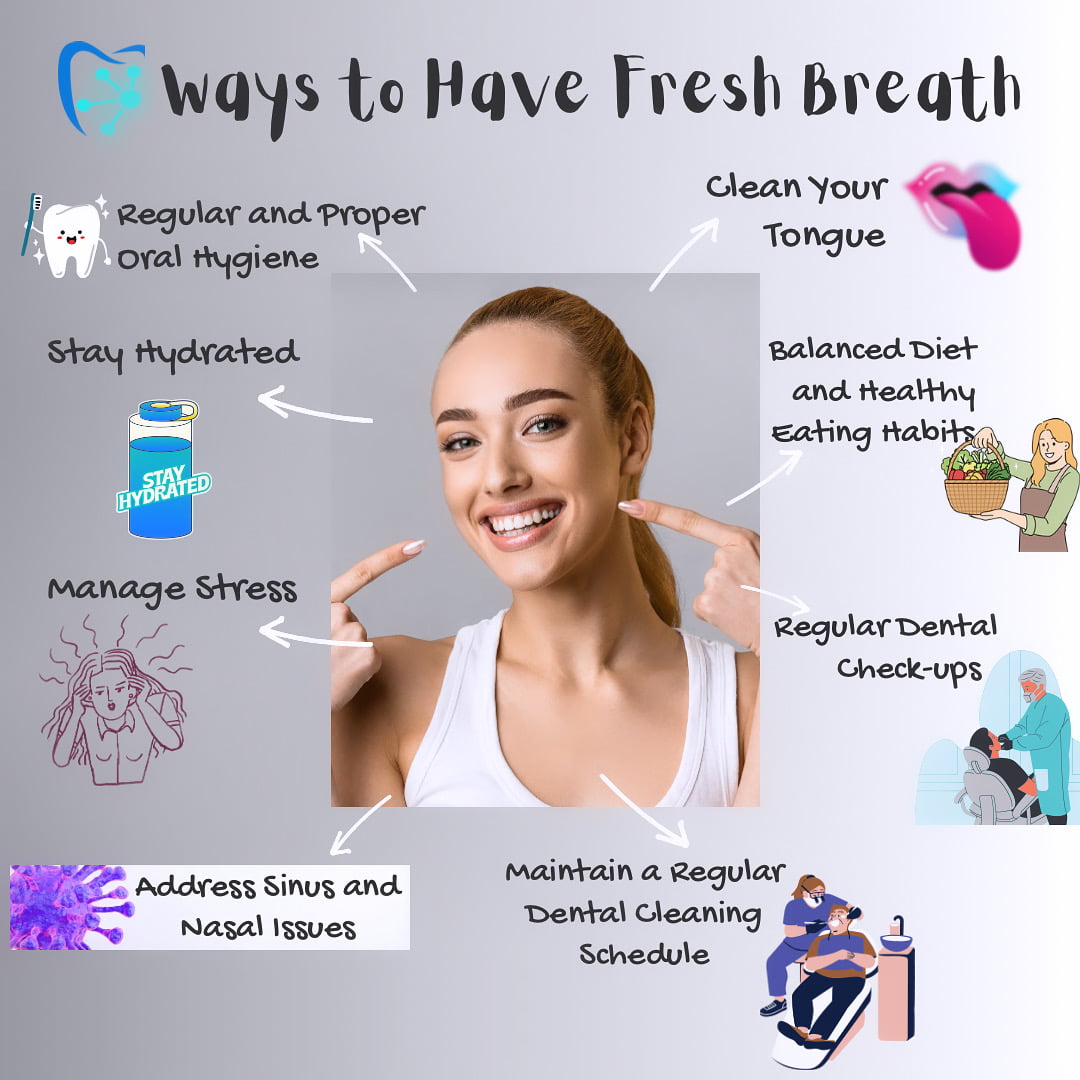Fresh breath is not only a sign of good oral hygiene but also contributes to overall confidence and well-being. Maintaining fresh breath throughout the day involves adopting effective habits and a proactive approach towards oral health. In this comprehensive guide, we will explore seven essential ways to achieve and sustain fresh breath.
- Regular and Proper Oral Hygiene
- Clean Your Tongue
- Stay Hydrated
- Balanced Diet and Healthy Eating Habits
- Regular Dental Check-ups and Cleanings
- Avoid Tobacco Products and Limit Alcohol Consumption
- Chew Sugar-Free Gum or Mints
- Rinse with Mouthwash
- Maintain a Regular Dental Cleaning Schedule
- Practice Good Denture Hygiene
- Address Sinus and Nasal Issues
- Stimulate Saliva Production
- Manage Stress
- Consider Herbal Remedies

Table of Contents
ToggleRegular and Proper Oral Hygiene
The foundation of fresh breath lies in regular and proper oral hygiene practices. Brushing your teeth at least twice a day, preferably after meals, is crucial in removing food particles and bacteria that can cause bad breath. Use a fluoride toothpaste and a soft-bristled toothbrush to clean all surfaces of your teeth, tongue, and roof of your mouth. Floss daily to remove plaque and debris from between your teeth and gums, ensuring a thorough clean.
Clean Your Tongue
Many people overlook the importance of cleaning their tongue while maintaining oral hygiene. The tongue can harbor bacteria, dead cells, and food residue, contributing to unpleasant breath. Use a tongue scraper or a toothbrush to gently clean your tongue, starting from the back and moving forward. Regular tongue cleaning helps eliminate the bacteria responsible for bad breath and leaves your mouth feeling refreshed.
Stay Hydrated
Drinking plenty of water throughout the day is not only essential for your overall health but also plays a vital role in maintaining fresh breath. Water helps keep your mouth moist and aids in producing saliva, which is crucial for neutralizing acids and washing away bacteria. Dry mouth can cause bad breath, so ensure you stay hydrated to promote a pleasant oral environment.
Balanced Diet and Healthy Eating Habits
The food you consume directly impacts the freshness of your breath. Avoid foods with strong odors, such as garlic, onions, and spices, as they can leave a lasting impact on your breath. Opt for a balanced diet rich in fruits, vegetables, whole grains, and lean proteins. Chew sugar-free gum or eat crunchy fruits and vegetables like apples and celery, as they can help clean your teeth and stimulate saliva production.
Regular Dental Check-ups and Cleanings
Scheduling regular dental check-ups and cleanings is fundamental to achieving and maintaining fresh breath. Dentists can detect and address oral health issues early on, preventing potential causes of bad breath. Professional cleanings help remove plaque and tartar buildup, ensuring your mouth remains clean and your breath stays fresh.
Avoid Tobacco Products and Limit Alcohol Consumption
Tobacco products, including cigarettes and smokeless tobacco, not only contribute to serious oral health issues but also cause persistent bad breath. Avoiding tobacco products is essential for achieving and maintaining fresh breath. Additionally, excessive alcohol consumption can lead to dry mouth and bad breath. Limiting alcohol intake and avoiding tobacco are key steps towards maintaining fresh breath.
Chew Sugar-Free Gum or Mints
Chewing sugar-free gum or sucking on sugar-free mints can be a quick and convenient way to temporarily freshen your breath. These products stimulate saliva production, which helps wash away bacteria and neutralize acids in the mouth. However, keep in mind that these are temporary solutions and should not substitute regular oral hygiene practices.
Rinse with Mouthwash
Using an antiseptic or antibacterial mouthwash can complement your oral hygiene routine and contribute to fresher breath. Mouthwash helps reduce bacteria, fight plaque, and rinse away food particles that may linger in the mouth. Rinse with mouthwash after brushing and flossing to achieve a thorough clean and a minty-fresh feeling.
Maintain a Regular Dental Cleaning Schedule
Apart from regular check-ups, ensure that you follow a consistent dental cleaning schedule. Professional cleanings by a dental hygienist can reach areas that are difficult to clean at home. These cleanings help remove plaque, tartar, and stains, promoting a healthier mouth and fresher breath.
Practice Good Denture Hygiene
If you wear dentures or other oral appliances, it’s crucial to clean them daily. Bacteria and food particles can accumulate on dentures, causing bad breath. Follow the manufacturer’s instructions for cleaning your dentures or removable oral appliances to maintain freshness and oral health.
Address Sinus and Nasal Issues
Sometimes, bad breath can stem from sinus or nasal problems. Allergies, sinus infections, or nasal congestion can lead to postnasal drip, contributing to unpleasant breath. Addressing these issues with appropriate medical care can help alleviate bad breath associated with nasal or sinus conditions.
Stimulate Saliva Production
Saliva plays a vital role in maintaining a clean mouth and fresh breath. Stimulate saliva production by chewing sugar-free gum or eating sugar-free candies. Additionally, consuming crunchy fruits and vegetables can naturally stimulate saliva, assisting in keeping your mouth moist and reducing dry mouth-related bad breath.
Manage Stress
Stress can impact your oral health and potentially lead to bad breath. Stress can contribute to conditions like dry mouth and poor oral hygiene habits. Practice stress management techniques such as regular exercise, deep breathing, or meditation to promote overall well-being and minimize the risk of bad breath.
Consider Herbal Remedies
Some herbs and natural remedies, like mint, parsley, and cloves, are known for their breath-freshening properties. Chewing on fresh parsley or fennel seeds can help neutralize odors. However, it’s important to use these remedies as complements to regular oral hygiene practices rather than as replacements.
Conclusion
fresh breath is attainable through a combination of consistent oral hygiene, a balanced diet, regular dental check-ups, and healthy lifestyle choices. By incorporating these fourteen ways into your daily routine, you can enjoy the confidence and comfort that comes with having a pleasant and fresh breath.

